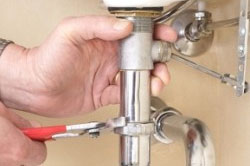Maintenance and installation of sewage systems, drains, pipes, toilets, and etc., are just a few of a plumber’s responsibilities. So, your toilet won’t flush? "Then call in a plumber" is the advice you often get from other people. You can be sure that the plumber will expertly solve your plumbing problems and answer all questions you may have for him or her.
Most plumbers are well-trained professionals who do their jobs extremely well. The common route to becoming a plumber is enrolling for a rigorous two year associate’s degree program. If this doesn’t apply in your particular case, then apprenticeships may work for you. After you are through with your training, then there are many entry level plumbing jobs to opt for.
A plumber’s training
Have you always wanted to be a plumber? To start with, attend an appropriate college and get well-rounded plumbing training and education. After you are through with your education, you will graduate with an Associate of Science degree in plumbing. A plumbing degree program is commonly offered at any of the many vocational and technical colleges in the country and is normally a two year program.
While in these colleges, you will be taught the various plumbing techniques available for industrial, commercial and residential structures. This is mostly through classroom lectures and hands-on training. By the end of the plumbing training program, a potential plumber is able to do most things a fully certified plumber can do. As such, he or she can find entry level plumbing jobs in any part of the country; however, you may still be required to join an apprenticeship to gain further experience.
Often considered by many potential plumbers as the best form of training, apprenticeships are normally four to five year programs incorporating classroom lectures with on-the-job training. Classroom lectures are in areas such as:
- Physics
- Chemistry
- Plumbing code and regulations
- Building blueprint reading
On-the-job training is provided by experienced plumbers who train and supervise the trainee, allowing them to attend real-life plumbing assignments. Furthermore, this form of training pays for your efforts.
Importance of a plumbing license
A license is required to legally practice as a plumber and it can be acquired by contacting the relevant state departments for licensing, but first you have to sit and pass the difficult plumbing licensure exams. Apart from this, there may be other requirements, for example, continuing your plumbing education every few years so as to keep your knowledge and plumbing skills up-to-date.
Another possible way to becoming a plumber
There are other ways to become a plumber in addition to the above-mentioned ways of becoming a plumber. Any of these will give you entry level plumbing jobs in country once you have completed the plumbing training. Some plumbing service providers hire novice plumbers that show potential and are willing to be trained on-the-job, but at a low pay. Although this type of training is often rigorous, it is common for people with close relatives or friends in the plumbing field. It offers a good training opportunity because you won’t be charged for the training and you will receive a wage as well.

- Home
- Jobs In Plumbing Information
- Entry Level Plumbing Jobs
- How To Bid A Plumbing Job
- Job Search Plumbing
- Jobs In Plumbing Qualifications
- Plumber Job Openings
- Plumbing Contract Work
- Plumbing Employment Agencies
- Plumbing Job Description
- Plumbing Jobs Agencies
- Plumbing Jobs Rates
- Plumbing Jobs Recruitment
- Plumbing Jobs Training
- Plumbing Jobs Websites
- Jobs In Plumbing USA
- Types Of Jobs In Plumbing
